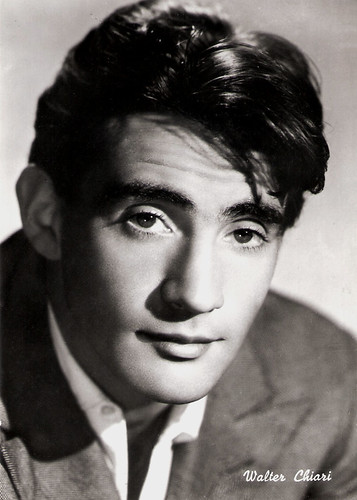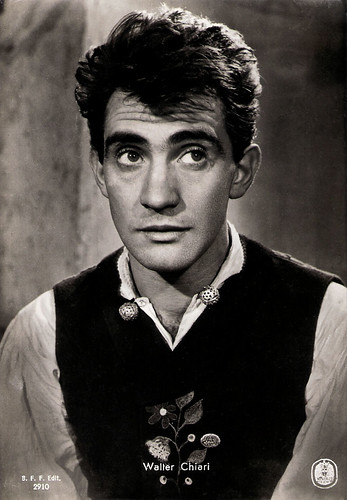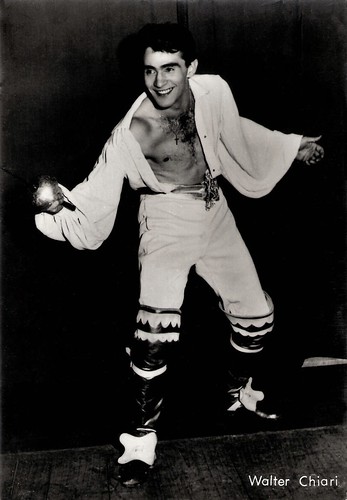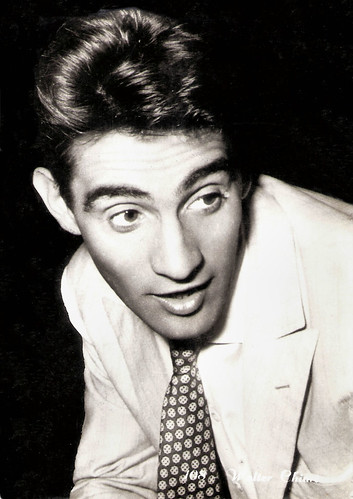
Italian postcard by Bromofoto, Milano, no. 311.

Italian postcard by B.F.F. Edit., Firenze, no. 2910. Photo: Minerva Film.

Italian postcard by Rotalfoto, Milano, no. 251.
Bellissima
Walter Chiari was the stage name of Walter Annicchiarico, born in Verona, Italy in 1924. His father, Carmelo Annichiarico, was a police official and his mother Enza was an elementary school teacher. The young Chiari was very athletic and both became swimming and boxing champion. He joined the army of the Italian Social Republic of Salò. After the end of the war, he spent a few months in prison for collaborating with the fascist regime. He got his first stage job thanks to actress Marisa Maresca, who offered him a part in the show 'Se ti bacia Lola' (If You Kiss Lola). Besides his good looks, he was spotted for his improvisation talent.
Chiari started his film career with a role in the drama Vanità/Vanity (Giorgio Pastina, 1947) with Liliana Laine and Dina Galli. The film, set in nineteenth-century Milan, is based on a play by Carlo Bertolazzi. Chiari was awarded a Nastro d'Argento for best debut performance. Next, he co-starred in the comedy hit Totò al giro d'Italia /Totò at the Tour of Italy (Mario Mattoli, 1948) starring Totò. It was the first of a long series of comedies, all directed by Mario Mattoli. Very successful was also I cadetti di Guascogna/The Cadets of Gascony (Mario Mattioli, 1950), in which he acted with another newcomer, Ugo Tognazzi. He made comedies with other directors too, such as O.K. Nerone/O.K. Nero (Mario Soldati, 1951) with Gino Cervi as emperor Nero.
Chiari appeared as a young, handsome scoundrel opposite Anna Magnani in Luchino Visconti's neorealism drama Bellissima (1951). The film, which is a satire of the film industry, was shot at the Cinecittà studios. Alessandro Blasetti, a contemporary film director, appears as himself. Bellissima centres on a working-class mother in Rome, Maddalena (Anna Magnani), who drags her young daughter (Tina Apicella) to Cinecittà for the ‘Prettiest Girl in Rome’ contest. Maddalena is a stage mother who loves movies and whose efforts to promote her daughter grow increasingly frenzied.
His first foreign film was the French-Italian film La minute de vérité/The Moment of Truth (Jean Dellannoy, 1952) with Michèle Morgan and Jean Gabin. It was followed by Nana/Nanà (Christian-Jaque, 1955), an adaptation of Émile Zola's novel Nana, starring Martine Carol and Charles Boyer, and the crime film Je suis un sentimental/Headlines of Destruction (John Berry, 1955) with Eddie Constantine. In Italy, he co-starred in the comedy Donatella (Mario Monicelli, 1956) for which Elsa Martinelli won the Silver Bear for Best Actress at the 6th Berlin International Film Festival.
For MGM, he co-starred in the romantic comedy The Little Hut (Mark Robson, 1957). During the making of The Little Hut, he met Ava Gardner who was still formally married to Frank Sinatra but lived already estranged from him. They started a passionate and tumultuous relationship. Next, he featured for Columbia in Bonjour Tristesse/Hello, Sadness (Otto Preminger, 1958) based on the novel by Françoise Sagan. In the meantime, he figured permanently in the tabloids as a womaniser. He had affairs with Silvana Pampanini, Elsa Martinelli, Delia Scala, Lucia Bose (with whom he had a long engagement), Anita Ekberg, Princess Maria Gabriella of Savoy and Italian singer Mina.

Italian postcard by Bromofoto, Milano, no. 136.

Italian postcard by Turismofoto, no. 108.
Don't worry, I'm merely catching up with sleep
During the 1960s, Walter Chiari continued to stare in light comedies by such Italian directors as Steno, Mario Monicelli, Dino Risi and Nanni Loy. Unlike many Italian actors of the time he had a full and fluent command of English that he put to good use in his Broadway spell, which in 1961 saw him performing in The Gay Life (a musical comedy inspired by an Arthur Schnitzler play) for 113 shows. He starred in They're a Weird Mob (Michael Powell, 1966), the last of the Powell and Pressburger films, based on a popular Australian novel by John O'Grady. He also appeared in Orson Welles’ Chimes at Midnight (1966), the Pan-European action-comedy Monte Carlo or Bust! (Ken Annakin, Sam Itzkovitch, 1969), the Australian film Squeeze a Flower (Marc Daniels, 1970), and the crime film The Valachi Papers (Terence Young, 1972) with Charles Bronson and Lino Ventura. The Valachi Papers tells the true story of Joseph Valachi, a Mafia informant in the early 1960s.
In 1970 Chiari was arrested and jailed in Rome on suspicion of cocaine possession and trafficking, with 70 days passing before he was bailed. Despite being known in show business as a cocaine user, Chiari enjoyed for years the de facto impunity often accorded to members of his trade (provided he kept his addiction private). The willingness of authorities to prosecute him, mounting a nationwide scandal, was seen by some as an attempt to distract public opinion from the fruitless search for the culprits of the Piazza Fontana bombing, which precipitated Italy in fear.
After his release and partial acquittal (he was deemed not guilty of the trafficking count and received a lenient sentence for the charge of drug possession for personal use) his career never completely recovered. According to Wikipedia, the Italian state television was off-limits for him, and all he could aspire to were parts in low-key comedies and local television appearances.
He concentrated on theatre and gave some good performances in plays such as Richard Brinsley Sheridan's The Critic, Marc Perrier's Six heures au plus tard and Samuel Beckett's Endgame. His final film was the Italian romance-drama Tracce di vita amorosa/Traces of an Amorous Life (Peter Del Monte, 1990) with Valeria Golina, which was in the competition at the 47th Venice International Film Festival.
The following year, Chiari died of a sudden heart attack in Milan, at home, in 1991. On that same day he had undertaken a complete, positive medical check-up. Not showing up at a dinner with a theatre manager where he should have discussed his involvement in a new production he was found by his host who reached the residence where he was living at the time, sitting in an armchair, in front of a functioning television. His gravestone carries the line he once mentioned to director Dino Risi as his favourite choice for an epitaph: "Don't worry, I'm merely catching up with sleep". In 1969 Walter Chiari married actress Alida Chelli. They divorced in 1981 and had one child. His son, Simone Annicchiarico (1970) became the lead singer of an Italian rock band and hosted the TV programs La Valigia Dei Sogni/Suitcase Of Dreams (2008-2009) and Italia's Got Talent (2009).
Italian trailer for Bellissima (Luchino Visconti, 1951). Source: CinemAmbiente (YouTube).
Italian trailer for Il giovedi (Dino Risi, 1963). Source: primocarnera07 (YouTube).
Trailer for They're a Weird Mob (Michael Powell, 1966). Source: irena0100 (YouTube).
Trailer for The Valachi Papers (Terence Young, 1972). Source: Tony Baretta (YouTube).
Sources: Hal Erickson (AllMovie), Biografieonline (Italian), Wikipedia (Italian and English) and IMDb.
This post was last updated on 24 September 2023.
No comments:
Post a Comment